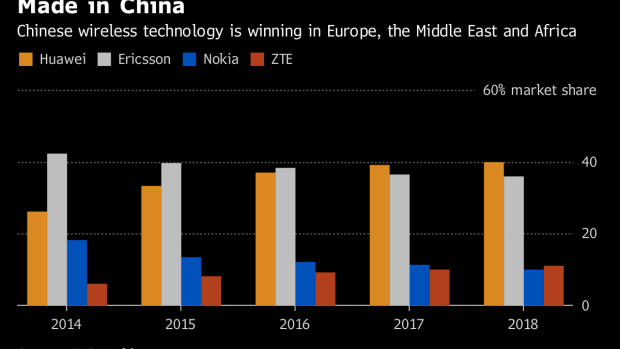Dec 15, 2018
Huawei Hemorrhages Allies in Europe on Growing Security Concerns
, Bloomberg News

(Bloomberg) -- The U.S. has been pushing governments for months to block Huawei Technologies Co. from telecom networks. That strategy is now taking hold in Europe, where the Chinese technology giant is losing allies by the day.
European officials and companies, initially slow to act on the U.S. warnings, this week increasingly distanced themselves publicly from the equipment supplier. The concern is that Beijing could use Huawei’s gear for spying -- something the company has always denied. While there have been no outright bans, the outlook is dimming for Huawei in its biggest market outside China.
“Reputational damage for Huawei will be significant whatever the outcome,” said Neil Campling, telecom, media and technology analyst at Mirabaud Securities Ltd. “It seems likely that Huawei will lose significant share in the next three years.”
In France, Orange SA said Wednesday it won’t use Huawei gear to build fifth-generation wireless networks, after BT Group Plc in the U.K. pledged to rip out some of the company’s equipment. In Germany on Thursday, Deutsche Telekom AG raised the prospect of dropping Huawei. Then Friday, the Norwegian government said it’s weighing concerns with using suppliers from countries with which there’s no security policy cooperation -- an oblique reference to China.
France is pushing for significantly tighter regulation, people with knowledge of President Emmanuel Macron’s plans told Bloomberg this week. The country has safeguards in place for critical parts of its telecom networks and is now considering adding items to its “high-alert” list that tacitly targets Huawei, some of the people said.
“It’s been a week of negative announcements and indications from the biggest markets in Europe -- the U.K., Germany and France,” said Bengt Nordstrom, CEO of telecom consultant Northstream. The continent’s biggest carriers will now be “extra cautious” of buying equipment from Huawei, Nordstrom said.
Troubles in Europe for Huawei come on top of bans of its equipment in Japan, Australia, New Zealand and the U.S., and follow the arrest of its Chief Financial Officer Meng Wanzhou, the 46-year-old daughter of founder Ren Zhengfei. Meng, accused by the U.S. of defrauding banks to mask violations of sanctions on sales to Iran, was granted bail by a Canadian court on Wednesday and awaits a possible extradition to the U.S. Her lawyer says she’s innocent.
Losing friends in Europe means Huawei risks missing out on orders for networks running into billions of euros. Deutsche Telekom, one of Huawei’s biggest European customers, alone plans to invest about 20 billion euros in Germany in 5G and other high-speed internet connections through 2021. Europe, the Middle East and Africa accounts for 27 percent of Huawei’s revenue.
The development of 5G, which will boost speeds and reduce the latency of connections to bring online a wave of new gadgets -- from devices in cars to manufacturing facilities -- has security and government officials worried that networks carrying sensitive data will be at greater risk of hacking.
The U.K., a member of the Five Eyes intelligence alliance, was the first major market in Europe to publicly raise doubts about the security of Huawei’s equipment in the run-up to 5G, last summer. The head of Britain’s spy agency MI6 said Dec. 3 that the government needs to decide whether to allow Huawei as a 5G supplier.
France’s National Agency for the Security of Information Systems, or Anssi, is demanding full access to potential suppliers’ technology, people familiar with the matter told Bloomberg. Unlike Nokia Oyj, Cisco Systems Inc. and Ericsson AB, Huawei hasn’t submitted its equipment for vetting to become certified for critical components and that de-facto disqualifies it, the people said.
In Germany, officials have become uncomfortable with Huawei’s participation in 5G and have been reviewing the issue.
Espionage concerns have long swirled around the closely-held company, run by a former military engineer. Huawei has always maintained that it’s independent and doesn’t give the government access to its equipment. It says it’s confident it can continue to supply “very important” European customers.
“We recognize the concerns about security with the introduction of new 5G networks, and those are concerns we share,” said Vincent Pang, the president of Huawei Western Europe, in a statement. “We think the answer lies in global cooperation and collaboration to ensure that networks are as secure as possible.”
Dropping Huawei in Europe wouldn’t be easy. Most carriers have ordered its equipment because the technology is often seen as superior to that of its rivals. And while some analysts have suggested eliminating Huawei could be a boon for the Scandinavian vendors in particular, there’s also a risk of supply-chain disruptions if the biggest player is taken out, Nordstrom said.
“There is a much bigger question at stake here: if we are deglobalizing the telecom industry, then no one wins,” Nordstrom said. “We are entering into an era of uncertainty.”
--With assistance from Niclas Rolander and Sveinung Sleire.
To contact the reporters on this story: Stefan Nicola in Berlin at snicola2@bloomberg.net;Thomas Seal in London at tseal@bloomberg.net;Helene Fouquet in Paris at hfouquet1@bloomberg.net;Marie Mawad in Paris at mmawad1@bloomberg.net
To contact the editors responsible for this story: Rebecca Penty at rpenty@bloomberg.net, Paul Sillitoe
©2018 Bloomberg L.P.





